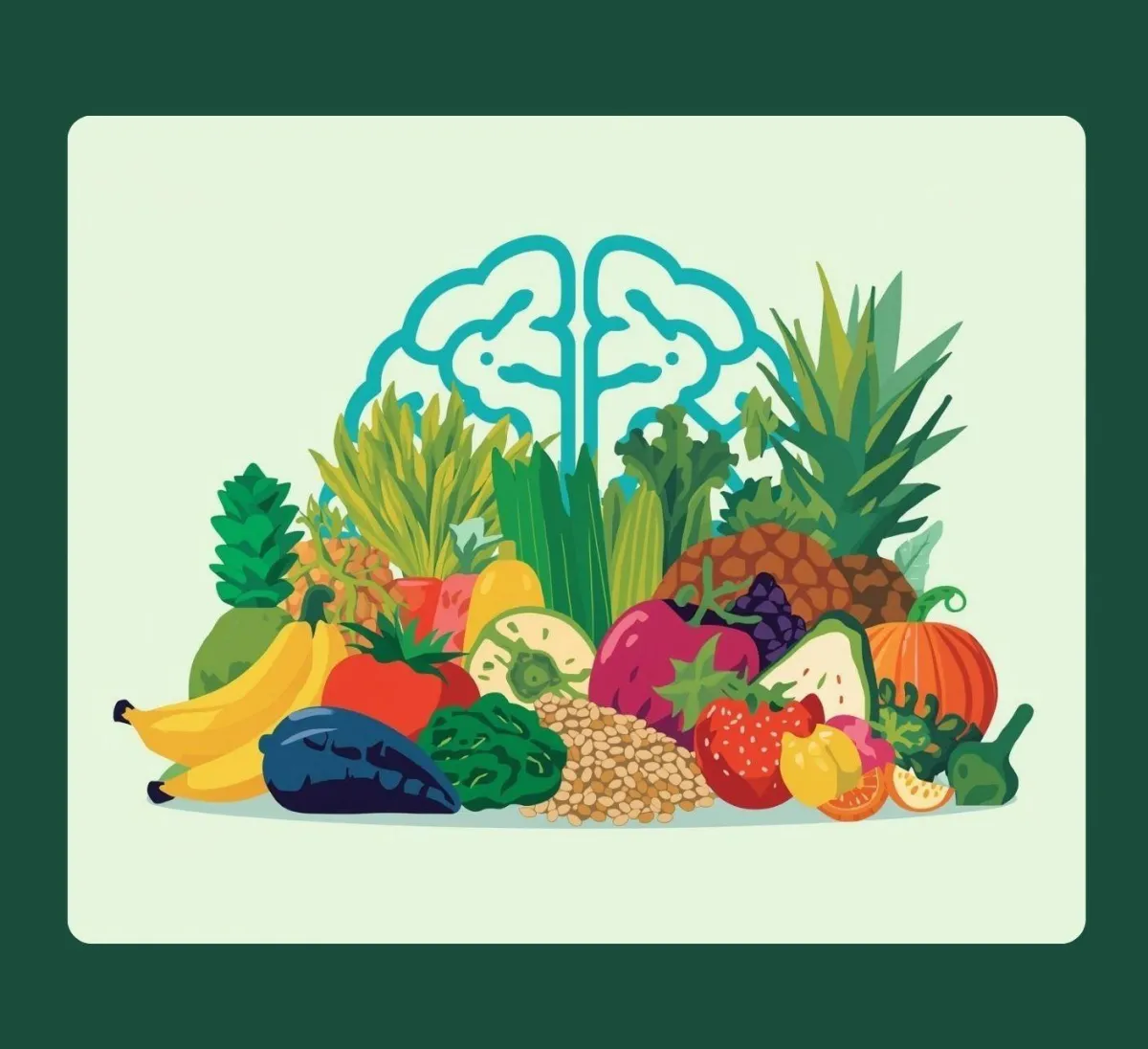NUTRITION

Overview
Brain Food. What you eat becomes you. Every cell of your brain, nervous system, and immune system was once a food you ate or drank. Your quality of life depends on what you feed your cells.
That is awesome news! And it is pretty simple. Let's look at the facts:
Nutrition plays a vital role in supporting the physical, emotional, and cognitive well-being of neurodivergent individuals, especially given their unique sensory, metabolic, and behavioral needs.
For people with neurodiversities such as autism, ADHD, dyslexia, or sensory processing differences, nutrition isn’t just about fueling the body—it’s about stabilizing mood, enhancing focus, and reducing anxiety in ways that align with their neurological wiring.
Why Nutrition Matters for Neurodivergent Individuals
• Sensory sensitivities and food aversions: Many neurodivergent people experience strong reactions to textures, smells, or tastes, which can lead to a limited diet and nutritional gaps. These aversions often make it difficult to consume a balanced variety of foods.
• Irregular eating patterns: Conditions like ADHD can cause hyperfocus or emotional overwhelm, leading to skipped meals or binge eating. This disrupts blood sugar levels, which in turn affects energy, mood, and executive function.
• Internal Signal challenges: Difficulty recognizing internal signals like hunger or fullness is common. This can result in overeating, under eating, or erratic meal timing, all of which impact emotional regulation and cognitive clarity.
• Safe foods and emotional comfort: Neurodivergent individuals often rely on “safe foods”—items that feel predictable and soothing. These foods offer emotional stability but may lack nutritional diversity, requiring gentle strategies to expand dietary options without triggering distress.
Biome Gut Health
Biome gut health refers to the balance and diversity of microorganisms in your digestive system, which play a crucial role in digestion, immunity, and overall well-being.
Your gut is home to a vast ecosystem called the gut microbiome, made up of trillions of microorganisms including bacteria, fungi, viruses, and parasites. This internal biome functions like a miniature city, with each species contributing to the health and stability of the whole system.
A biome is an ecological community defined by its environment and inhabitants. In your body, the gut biome is the ecosystem inside your intestines.
It contains over a thousand species of microbes, most of which are beneficial and live in symbiosis with you.
Think of your gut biome as a thriving garden: when well-tended, it flourishes and supports your whole body. When neglected, weeds take over and the ecosystem suffers.
What Does It Do?
• Digestion: Microbes help break down complex carbohydrates and fibers that your body can’t digest alone. This process produces short-chain fatty acids (SCFAs), which nourish your gut lining and support metabolic health.
• Vitamin synthesis: Gut bacteria produce essential vitamins like B1, B9, B12, and K, which are critical for energy, blood health, and bone strength.
• Immune support: A healthy microbiome trains your immune system to distinguish between harmful invaders and friendly microbes, reducing inflammation and autoimmune risks.
• Barrier protection: It maintains the integrity of your gut lining, preventing “leaky gut” syndrome, which is linked to allergies, inflammatory bowel disease, and other chronic conditions.
How to Support Gut Biome Health
• Eat diverse plant-based foods rich in fiber (e.g., legumes, whole grains, vegetables).
• Include fermented foods like yogurt, kefir, sauerkraut, and kimchi.
• Avoid excessive antibiotics and highly processed foods.
• Consider probiotics and prebiotics to nourish and replenish beneficial microbes.
Nutrition is deeply intertwined with mental health, executive function, and emotional resilience. For neurodivergent individuals, a compassionate, structured, and sensory-aware approach to eating can dramatically improve quality of life—supporting not just physical health, but also confidence, autonomy, and self-esteem.
How To Find A Nutrition Plan
Finding the right nutrition plan involves several steps to ensure it aligns with your neuro type, personal health goals, lifestyle, and preferences. Below are tips to help you get started:
1. Assess Your Goals: Determine what you want to achieve with your nutrition plan. Are you looking to lose weight, build muscle, manage a health condition, or simply improve your overall health?
2. Consider Your Neuro Type and Lifestyle: Take an honest look. Is your food routine and lifestyle workable? Sustainable? Think about your daily routine, work schedule, and any dietary restrictions or taste preferences you have. Choose an approach that honors your neuro type! Feel free to talk with Felicia. Book a Discovery Call. Free.
3. For Health Concerns: Consult a registered dietitian or nutritionist who can provide personalized advice based on your health needs and goals.
4. Research Different Diets: Look into various plant-based nutrition plans, such as the Mediterranean diet. There are many. Each has its own benefits and suits different needs.
5. Start Simple: Begin with small, manageable changes rather than overhauling your diet all at once. Gradual changes are easier on your gut, and easier to maintain long-term.
6. Monitor Your Progress: Track your 'before' measurements (unless that is a stressor.) Notice even your small wins! Make adjustments as needed. This can help you ensure the plan is working for you.
7. Learn Gut Biome Basics: This is key to overall health. Avoid fad diets and quick fixes.
Take your time, and find a nutrition plan that works for your neuro type and lifestyle. You can do this!
For Easy & Simple Support: Whatever eating plan you choose, Juice Plus Whole Food products can help provide a solid base of nutrition for your cells, brain, and gut biome. Purity, quality, and convenience, backed by evidence and research studies.
Getting Started
Our Why:
Felicia says: I am really obsessive about healthy food. Frankly, I am a perfectionist. So, I did everything perfectly. It was exhausting, and took a lot of time and attention. I want to focus on other priorities. With Juice Plus nutrition I know we are getting what we need, without a lot of fuss. It frees me up to live my life.
Brian says: I knew the importance of eating fruits and vegetables but I skipped them because I didn't like the taste.
I found a great way to get the nutrition of fruits and vegetables in an easy- to-take form.
Juice Plus+ Company helps both our neuro types!
And with the Healthy Starts program, an adult can sponsor a child (up to age 25) to get free children's supply.
Here’s a breakdown of Juice Plus+ main product categories:
designed to bridge the gap between what you eat and what you should eat:
Gut Health Support
• Super-Biome Probiotic + Prebiotic: Designed to support digestive health and microbiome balance.
Juice Plus+ Essentials
• Fruit Blend Capsules: Concentrated nutrients from fruits like apples, oranges, and pineapples.
• Vegetable Blend Capsules: Includes spinach, broccoli, carrots, and more.
• Omega Blend Capsules: Plant-based omega-3, -5, -6, -7, and -9 fatty acids sourced from algae, pomegranate seed, and other oils.
Superfood Powders
• Juice Plus+ Superfood Powder: A blend of fruits, vegetables, legumes, grains, and superfoods to support cardiovascular and immune health.
Mental Clarity
• Juice Plus+ Luminate: to enhance mental clarity, energy, and focus.
Shakes
Complete shakes for smoothies. Performance shakes, tailored for athletic performance, offering enhanced antioxidant protection and immune support.
All products are whole-food based, vegan, and formulated to deliver scientifically backed nutrition. Juice Plus+ emphasizes convenience and consistency in daily wellness routines, often promoting bundles like the “Mind + Body Wellness Duo” for combined benefits.
Note: When you buy from the Juice + link below, you support our neurodiversity community and Train Your Genius.com.
RESOURCES
© 2025 Train Your Genius
